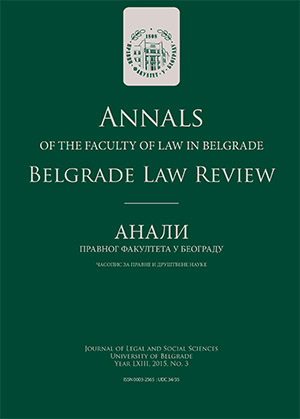PATRIA POTESTAS OR MURDER IN THE FAMILY
PATRIA POTESTAS OR MURDER IN THE FAMILY
Author(s): Miroslava MirkovićSubject(s): History of Law, Criminal Law, Civil Law
Published by: Правни факултет Универзитета у Београду
Keywords: Patria potestas; Vitae necisque potestas; Pater; Patricii; Legal marriage;
Summary/Abstract: Patria potestas appears in the tradition in two aspects: as the father’s right to put his son to death and as the right to dispose of the family property. All examples concerning the murder of the son (or daughters) known to the Roman authors are from the time of the Roman Republic. The father’s right to dispose of the property even when the son is an adult lasted until the Later Empire. In a detailed study W. V. Harris limited his disucussion to ten examples of the son’s murder and three of the daughter. They are mostly not qualified as the ius vitae ac necis by the Roman authors. It is important to stress: a) That these examples mainly illustrate the father’s right in charge as the high magistrate. In putting their sons to death the fathers magistrates did not use the vitae necisque potestas of the father but the authority of supreme state officers. The crimes of which the sons were accused belonged not to family affairs but to offenses against the military discipline and State interests. b) The only condition in applying the vitae necisque potestas was a moral one, the existence of the iusta causa. Even then it was not unpunished, and in many cases the father went into exile. c) The father’s power existed only over legally born children within a legal marriage. Legal marriage was the privilege of patricians until 444 BC. That means that the patria potestas was originally limited only to patrician families. Biological kinship was not a decisive factor in the restitution of the father – children connection. d) The main right of the pater in the family was not to kill its members, but to preserve his position in economic control and to dispose of the property which was once common and eventually to control the moral behavior of the family members.
Journal: Анали Правног факултета у Београду
- Issue Year: 63/2015
- Issue No: 3
- Page Range: 5-17
- Page Count: 13
- Language: English

